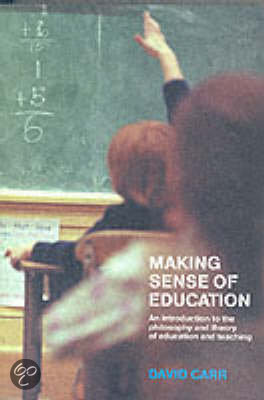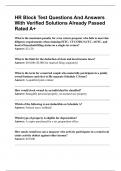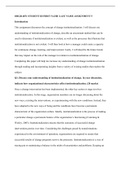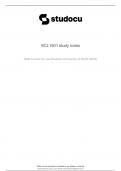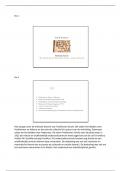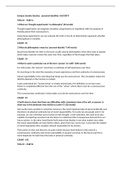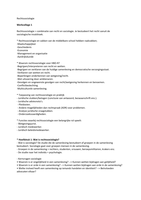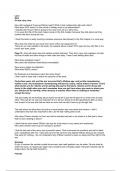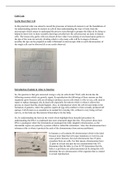Annemijn Smulders
Hoofdstuk 1: Education, teaching and professional practice.
The concept of education
Any sensible account of education needs to steer a course between reasonable pluralism (different
ideas about education) and indiscriminate relativism (not all rival conceptions of education are
equally worthy of serious rational consideration).
Some notions:
1) There is a relationship between education and learning: whatever is learned in the course of
education could hardly be other than the matter of the acquisition of skills, capacities,
dispositions or qualities not previously possessed.
2) Any learning surely proposes learners; so : subjects of education + education in subjects.
3) There are apparent links between education, learning and teaching.
4) There is a association between education and schooling.
Education and persons
The category of learners is larger than that of educated or educable beings.
Carr: there is something rather inexact or misleading about regarding humans as the subjects of
education; education concerns the initiation (‘inwijding’) of human agents into the rational
capacities, values and virtues that warrant our ascription to them of the status of persons.
- (biological) humanity might not be necessary for personhood
- Carr about ‘Person’: a bearer of rational and practical capacities, values and traits of
character, which are themselves inconceivable apart from complex networks of interpersonal
association and/or social institution.
- Descartes:
o Cartesian dualism: minds and souls are non-physical or immaterial entities that are
distinct from psysical bodies with which they are associated.
o Features of human personality, character and value seem resistant to explanation
and understanding in the natural scientific terms of physics, chemistry or biology.
o Open question whether it is appropriate to regard psychology as a statistical science
in the manner of physics or chemistry.
o Denial of any complete reduction of ‘soul’, mind, biography or history to the causal
and statistical discourses and categories of natural science.
o Critiques:
It is difficult to see how public and practical features might be properties of anything
even potentially disembodied (‘losstaand’).
If the mentality of personhood cannot be defined apart from certain public
institutions and practices, then it can hardly be possessed by essentially
disassociated ( ‘gedistantieerd’) individuals. (such as criminality)
- Kant:
o Attempts to reconcile (‘verenigen’) the basic insights of empiricism and rationalism in
‘Critiques of pure and practical reason’.
, Carr: Making sense of education
Annemijn Smulders
o Moral agent is a non-empirical subject of an other-worldly moral law.
o The real personhood of pure and practical reason has to be significantly independent
of the World of familiar self-referenced (if not self-interested) drives and motives.
o The real person is not the empirical self of familiar everyday association, but rather
the metaphysical self of transcedent practical rationality.
Suggestion: Education primarily concerns the promotion of personhood.
Ideas of person and education are normative notions;
o Ideas about Personhood is the initiation of human culture (free creation of rational
agents confronts us with the question of deciding which of the numerous forms of
learning encounters in human culture(s) are to be considered crucial for the persons
development of young people.
o Ideas about Education: Some philosophers say it is about the development of mind,
but it seems clear that education is about the initiation of practical skills/knowledge,
but also about theoretical skills/knowledge.
Education, culture and value
Reasonable definition of aims of education and schooling: “To equip individuals with the knowledge,
understanding and skills apt for a personally satisfying, socially responsible and economically
productive life.”
- Such generalities require considerable further specification in the interests of some
resolution of potential (irresolvable) tensions.
Educational- traditionalists: economic goals
Progressive/ Child-centered education: goals of personal growth and fulfillment
- The standard school curriculum seems to contain forms of knowledge of rather diverse
human significance and value.
o Simple usefulness (such as home economics)
o Vocational training of certain types of learner (such as auto-repairing/ secretarial
skills)
o Instrumentally useful (general level of health/fun/interests; such as physical
education)
- Some subjects may be pursued as personal interests or passions much the same way as sport
or dance, and others may devote themselves to reading great literature. There is a
connection literature- education, not with golf-education.
- Learning about history seems crucial tot educated sensibility- and so if education is lifelong
process, it must also be of enduring interest to the educated and self- educating adult.
The purposes of education and learning
Instrumental and Teleological senses of ‘for’. (“Rechtvaardiging”)
Teleological justification:
- In terms of the purpose/ aim; close to the thing itself (ex.: relax when you go out)
Instrumental justification:
- In terms of (personal) utility (ex.: find someone to kiss when going out)
, Carr: Making sense of education
Annemijn Smulders
Example: The sexual conservative is expressing a teleological (and biologically accurate enough) point
about what sexuality is for, although any (sociological)observation to the effect will tell that this is not
why many people engage in it. (pleasure, love, control)
Related to distinction between intrinsic and extrinsic value.
No human agent could live his or her entire life on the basis of instrumental motivation, since any
chain of instrumental justifications must logically end somewhere with something I do for its own
sake (teleological) rather than for that of a further thing.
The trouble with the distinction between extrinsic and intrinsic value is that it is ambiguous
(‘dubbelzinnig’) between the teleological and instrumental justification or purpose distinction, and
that between intrinsic and extrinsic motivation. It has different meanings in those cases.
The interests and activities that people do value for their own sake are not the sort of things that
would be educationally desirable.
Rational agents cannot without self-contradiction reject what we se as educationally valuable forms
of knowledge and understanding: confusion of intrinsic worth with intrinsic motivation issues in an
attempt to prove too much.
Connection between intrinsic value and education is that the capacity tot value things for their own
sake is arguably a necessary condition of educatedness. However it is neither a necessary nor a
sufficient condition of the educational value of a subject or activity that it is valued for its own sake.
Education is about equipping people with knowledge, understanding and skills that are helpful in
adult life; without ever valuing them for their own sake. Such forms of knowledge are more
constitutive (“vaststaand”) features of personhood that contingent (“toevallig”) or disposable
(“beschikbaar”) commodities ( “handelswaar”) of individual and social consumerism.
It seems incomprehensible why so many artistic and scientific subjects and activities with little or no
ultimate practical utility to the majority of learners have found a time-honoured place in most past
and present school curricula.
Education, schooling and curriculum
Education will have tot be valued non-instrumentally or for its own sake, rathert hat fors ome
external goal- and fits neatly with the point that what education itself is is what (teleological)
distinguishes its purposes and goals from those of such other processes as socialisation, training or
therapy. Developing knowledge and understanding is not something we aim tot do by means of
education, but just what education means.
“Education must be directly useful”(such as: hairdressers, teachers)
, Carr: Making sense of education
Annemijn Smulders
“Education leads to a better understanding of the World and personhood- not directly aimed at a
certain profession”- Matthew Arnold
- Founding father of Liberal traditionism, 19th century
- Argued against the instrumentalism, so is non-instrumentalist
- Purpose of education: equip individuals with the values, virtues and sensibilities of civil and
civilised association.
- Insofar education ought to be ‘based on the nature and significance of knowledge itself, an
not on the predilictions of pupils, the demands of society, or the whims of politicians’
- The curricular content of schooling is not significantly answerable to the non-educational
socio-economic therapeutic or other interests of non-professional private or public agencies.
- Vocational an socio-economic concerns should always play a secondary educational fiddle.
State educational policy making in most competitive past and present economies has more
often been dominated by a utilitarian or instrumentalist mindset.
Carr: confusions about some terms
- The debates between instrumentalists and non-instrumentalists are basically about the
confusion between education and schooling.
o Schooling: social institution, provided for out of public funds; accountable for the
desires of taxpayers and their elected representatives.
o Education: More than schooling. Lifelong education of learning, but not of lifelong
schooling.
Education, theory and practice
Since the turn of general ‘practical’ or anti-Cartesian in modern philosophy there are 3 dialectical
manoeuvres that have attracted persistent criticism.
1. Tendency to identify the difference between the educational and the non-educational with a
distinction between activities and skills valuable in themselves and activities and skills
valuable only as a means to an end.
2. Difference between activities and skills valuable in themselves and activities and skills
valuable only as a means to an end with a distinction between the theoretical and the
practical.
3. The theory-practice dichotomy (“tweedeling”) with a distinction between the vocational
(“Beroeps/Professioneel”) and the non-vocational.
But: Initiation into the arts is often as much a practical as a theoretical matter, but the educational
potential of such initiation can hardly be doubted. And theoretical physics and archaeology may be
vocational without being practical- or even especially useful. And woodwork is variously useful, but
little of vocational use.
Wouldn’t it be best to jettison (“overboord werpen”) all these distinctions and simply
regard education as a matter of initiation into any generally morally acceptable activities
conducive (“bevordelijk”) to the pursuit of a person’s purposes or projects?
Carr: No!
1. Abandonment of distinctions is self-undermining; the task of educational
philosophers is not to abandon, but sharpen them for more precise use.
, Carr: Making sense of education
Annemijn Smulders
2. The argument “It is little more than elitist prejudice to regard some forms of
intelligent practice- woodwork or cuisine- as less educationally valuable simply
because they are practical and useful” is fallacious; succeeds only by ignoring the
very different roles which that principled understanding (however practically
acquired) that constitutes scientific knowledge, and the grasp (however intellectual)
of any principles that inform (say) effective hairdressing, play in personal formation.
Carr: The architects of modern liberal traditionalist non-instrumentalism were very anxious to show
that there is a cultural inheritance to which all young persons are entitled- irrespective of differences
of ability, social background and vocational destiny- and into which it is therefore the sacred duty of
schools to acquaint each and every child-
All should be exposed to literary, historical, cultural and moral appreciation. This is not to deny that
differences of individual ability, interest and background circumstances must have a bearing upon
questions about how the design of the school curriculum should go, and on whether the same sort of
educational exposure is ultimately suitable for all.
Chapter 2: The complex character of teaching
Senses of teaching
Senses of “teaching” and “education” may sometimes coincide.
There are 3 fairly distinct senses of ‘teaching’
1. Teaching as “The Practice of education”
2. Teaching as a particular sort of occupation or Role; profession/vocation
3. Teaching as an Activity – datable episode/particular period of time/ with(out) interruption
They may come apart in different ways:
o Learn somebody a simple skill, such as tying shoelaces- without being either concerned with
the practice of education or a member of the teaching profession. (Only activity, no practice
or role)
o A teacher concerned about his overall promotion can be less concerned with teaching as an
activity, and only gives instructions; refrain from direct intervention
o Teachers who engage in in teaching activity, but are less concerned with the promotion of
education in the broader sense.
o It would appear that there is a fairly common use of the term ‘teaching’ in something like the
‘educational’ sense which is not connected with either the role or activity senses. (Examples:
Jezus, Socrates, Buddha: no ‘professional’ teachers, but still known)
>> It is a matter of what someone has to say and how they say it: we might look for good
teaching in the content no less than in the form of what is taught.
Carr: it seems possible to to regard some as great teachers in the educational sense who are
hardly if at all teachers in the role or activity senses. >> do not conceive teaching only in (the
sophistical) terms of activity and process , but also in terms of content.
, Carr: Making sense of education
Annemijn Smulders
Teaching as activity and performance
Teaching is a normative concept: teaching is apt for appraisal as good or bad, effective or ineffective,
according to more or les observable standards of success.
When you want to say something about effectiveness, teaching= “An intentional or deliberate
attempt to bring about learning.” So good or bad teaching would appear to be indexed in causal or
productive terms.
Carr: We might ask: “Is pedagogical success or effective teaching always measurable by the standards
of causal or technical effectiveness?”
- Learning may be understood in terms of the acquisition of a skill (such as a handstand), but
the teaching itself is also a skill: namely a skill that is productive (‘Voortbrengend’) of other
skills.
>>An obvious appeal of this instrumental or technicist conception of teaching as a ‘skill-
promoting skill’ is that is seems often to be linked to a basically natural scientific conception
of learning as the acquisition of adaptive behaviour.
>>On this view learning and teaching are not just behavioural processes, they are also
processes that can be identified, modified and refined in the light of scientific research and
experiment = educational theory is conceivable as a branch of scientific theory. >> authority
of expertise from professional practice to academy.
The activities of teachers in schools are bound to the national policies. The competence models of
professional preparation have 2 noteworthy features
1. Clearly traceable to the sort of scientific approaches to pedagogy; testable behaviours
2. The promotion of such models has mostly been politically rather than professionally
motivated; supported mainly by those whose interest lies in securing the accountability of
teachers to centrally prescribed norms.
Teaching and skill
It is useful to make a distinction between:
1. Those who would agree with technicists that pedagogy is essentially a matter of skill-
acquisition, but disagree that the skills are primarily technical abilities identified on the basis
of scientific inquiry or research.
o Most common
o Historically renowed (“Beroemd”) teachers, such as Jezus or Socrates
2. Those who would be disinclined ( “geneigd”) to regard the activity of teaching as primarily or
necessarily-or, at the very least, as exhausted by- the acquisition of skills as such at all.
General advice to teachers: employ a mixed economy of teaching approaches or styles and vary
between instruction, inquiry, discussion and activity: balance these in the appropriate contexts.
The dilemma: on the one hand, insofar as the generalities of professional educational researchers
ignore particular contextual features, they can be of little or no use to practioners; on the other, if
they are sensitive to the context, then they can have no very general professional relevance. On this


